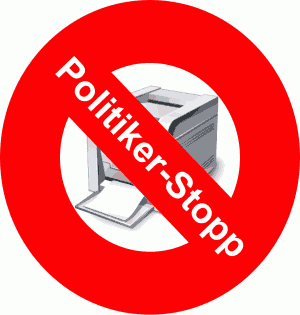"Bei UNS ist Atomkraft sicher"
April 15th, 2016, 09:33Nicht nur in Philippsburg, auch in Biblis wurden Sicherheitsprüfungen nicht durchgeführt, aber protokolliert, geht aus Rundfunkberichten hervor.
Nicht nur in Philippsburg, auch in Biblis wurden Sicherheitsprüfungen nicht durchgeführt, aber protokolliert, geht aus Rundfunkberichten hervor.
 Und folgerichtig werden in Deutschland demnächst anonym erworbene SIM-Karten verboten. Weiter, weiter ins Verderben.
Und folgerichtig werden in Deutschland demnächst anonym erworbene SIM-Karten verboten. Weiter, weiter ins Verderben.
(Bild: daMax [CC BY-NC],
based on this by Thomas Hawk [CC BY-NC])
Wenn eine Stellenanzeige so losgeht:
Reizen Sie spannende IT-Projekte für namhafte Kunden? Spannende Aufgaben am Limit des technisch Machbaren?
bin ich direkt raus. Mal im Ernst: wer sucht bitte einen Job "am Limit des technisch Machbaren"? So masochistisch kann doch gar niemand sein ![]() Herr, lass Hirn ra!
Herr, lass Hirn ra!
PS: aber für Fefe wäre gerade eine Stelle frei ![]()
Das mit externer Hilfe entsperrte iPhone des Attentäters hat der US-Bundespolizei bislang offenbar keine neuen Informationen gebracht.
In other news: water is actually wet!
Den Personen werden von der Polizei Teilnahme an einer nicht genehmigten Demonstration, Verkehrsbehinderung und verwandte Ordnungsverstösse zur Last gelegt.
The best democracy money can buy.
PS: in Island trat der Premier deswegen zurück, ne? So als kleiner Realitätsabgleich.
Das sind so Headlines, wo ich mir an den Kopp langen könnte. Wie die sich anfangs gegen Streaming gewehrt haben... ![]()
Bundesfinanzminister Wolfgang Schäuble und sein Staatssekretär Werner Gatzer haben nach SPIEGEL-Informationen jahrelang den Kontakt mit einem Whistleblower verweigert. Der Mann hatte über dubiose Geschäfte einer Briefkastenfirma in Panama auspacken wollen. Die dem Finanzministerium unterstellte Bundesdruckerei hatte diese Firma benutzt, um Geschäfte in Venezuela zu machen.
Ich wiederhole mich: wir werden von Gangstern regiert, die allesamt aus dem Amt gejagt gehören.
 Har har. Der Architekt der "Großen Firewall" (= Chinas Zensurinfrastruktur) durfte seine eigene Medizin kosten. Auf einem Podium wollte er den Beweis antreten, dass andere Länder noch viel mehr zensieren als China. Dazu wollte er auf eine südkoreanische Website zugreifen, woran ihn seine eigene tolle Zensursoftware aber hinderte:
Har har. Der Architekt der "Großen Firewall" (= Chinas Zensurinfrastruktur) durfte seine eigene Medizin kosten. Auf einem Podium wollte er den Beweis antreten, dass andere Länder noch viel mehr zensieren als China. Dazu wollte er auf eine südkoreanische Website zugreifen, woran ihn seine eigene tolle Zensursoftware aber hinderte:
Das habe wegen des staatlichen Zensursystems seines Landes nicht geklappt, weswegen er live einen VPN-Zugang einrichten musste – eine Technik, die gerne gegen staatliche Blockaden angewandt wird. Eine anschließende Fragerunde sei abgesagt worden und im Nachhinein habe sich im Internet viel Spott und Häme über Fang ergossen.
Merke: Zensur ist das, was der politische Gegner macht. Das eigene Land schützt™ den Bürger™ vor terroristischer©™ Propaganda™.

Böse? Ja. Aber das geht schon klar. Kontext verpasst? Oder den älteren Kontext vielleicht?
(via dingens)Das wird in den nächsten Wochen noch für den einen oder anderen Rücktritt sorgen, denke ich. Für Eilige, hier ein Tagesschau-Artikel.
Ein enormes Datenleck hat Geschäfte von rund 215.000 Briefkastenfirmen offen gelegt. Die Unterlagen zeigen, wie Spitzenpolitiker, Sport-Stars und Kriminelle weltweit ihr Vermögen verschleiern. NDR, WDR und "Süddeutsche Zeitung" konnten auf mehr als elf Millionen Dokumente einer Anwaltskanzlei in Panama zurückgreifen.
Update: Heise dazu.
panama papers

Kontext und mehr Kontext.
Ey, lass mich einfach rein, okay? |
Ich will das hier nie wieder sehen. |

Ihr Browser versucht gerade eine Seite aus dem sogenannten Internet auszudrucken. Das Internet ist ein weltweites Netzwerk von Computern, das den Menschen ganz neue Möglichkeiten der Kommunikation bietet.
Da Politiker im Regelfall von neuen Dingen nichts verstehen, halten wir es für notwendig, sie davor zu schützen. Dies ist im beidseitigen Interesse, da unnötige Angstzustände bei ihnen verhindert werden, ebenso wie es uns vor profilierungs- und machtsüchtigen Politikern schützt.
Sollten Sie der Meinung sein, dass Sie diese Internetseite dennoch sehen sollten, so können Sie jederzeit durch normalen Gebrauch eines Internetbrowsers darauf zugreifen. Dazu sind aber minimale Computerkenntnisse erforderlich. Sollten Sie diese nicht haben, vergessen Sie einfach dieses Internet und lassen uns in Ruhe.
Die Umgehung dieser Ausdrucksperre ist nach §95a UrhG verboten.
Mehr Informationen unter www.politiker-stopp.de.